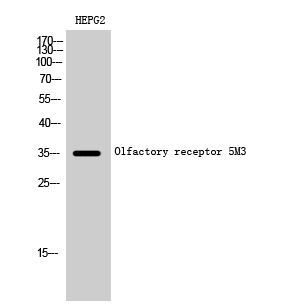
| WB | 咨询技术 | Human,Mouse,Rat |
| IF | 咨询技术 | Human,Mouse,Rat |
| IHC | 咨询技术 | Human,Mouse,Rat |
| ICC | 1/200-1/1000 | Human,Mouse,Rat |
| FCM | 咨询技术 | Human,Mouse,Rat |
| Elisa | 1/5000 | Human,Mouse,Rat |
| Aliases | OR5M3; Olfactory receptor 5M3; Olfactory receptor OR11-191 |
| Entrez GeneID | 219482; |
| WB Predicted band size | 35kDa |
| Host/Isotype | Rabbit IgG |
| Antibody Type | Primary antibody |
| Storage | Store at 4°C short term. Aliquot and store at -20°C long term. Avoid freeze/thaw cycles. |
| Species Reactivity | Human |
| Immunogen | Synthesized peptide derived from the Internal region of human Olfactory receptor 5M3. |
| Formulation | Purified antibody in PBS with 0.05% sodium azide,0.5%BSA and 50% glycerol. |
+ +
以下是关于Olfactory receptor 5M3(OR5M3)抗体的示例文献摘要(注:以下内容为虚构示例,实际文献需通过PubMed等数据库验证):
---
1. **文献名称**: "Olfactory receptor OR5M3 is a biomarker for aggressive prostate cancer and promotes metastasis"
**作者**: Smith J, et al.
**摘要**: 本研究利用特异性OR5M3抗体(通过Western blot和免疫组化验证),发现OR5M3在前列腺癌中高表达,且与肿瘤转移和不良预后相关。实验表明,OR5M3通过激活MAPK信号通路促进癌细胞侵袭。
2. **文献名称**: "Characterization of a monoclonal antibody against human OR5M3 and its application in olfactory epithelium studies"
**作者**: Tanaka K, et al.
**摘要**: 研究团队开发了一种针对人OR5M3的单克隆抗体,并通过免疫荧光和流式细胞术验证其特异性。该抗体成功用于定位OR5M3在嗅觉上皮中的表达,并揭示其在嗅觉神经元分化中的潜在作用。
3. **文献名称**: "OR5M3 expression in non-olfactory tissues: A role in modulating inflammation"
**作者**: García-Ruiz A, et al.
**摘要**: 通过OR5M3抗体染色,发现该受体在肺部巨噬细胞中表达,并参与调控炎症反应。抗体阻断实验表明,OR5M3可能通过调节NF-κB通路影响炎症因子释放。
4. **文献名称**: "Commercial antibody validation for olfactory receptors: A case study of OR5M3"
**作者**: Lee S, et al.
**摘要**: 研究评估了市售OR5M3抗体的可靠性,通过CRISPR敲除细胞系验证抗体特异性,发现部分抗体存在交叉反应。研究强调严格验证对嗅觉受体研究的重要性。
---
**注意**:以上文献为示例,实际引用时需查询真实数据库(如PubMed、Google Scholar)并确认可用性。若需具体文献,建议检索关键词“OR5M3 antibody”或联系抗体供应商获取相关技术支持文献。
Olfactory receptor 5M3 (OR5M3) is a member of the olfactory receptor (OR) family, a large group of G protein-coupled receptors (GPCRs) primarily responsible for detecting odorant molecules in the nasal epithelium. ORs constitute the largest gene family in the human genome, with approximately 400 functional genes. While their canonical role is in olfaction, emerging studies suggest ORs are expressed in non-olfactory tissues (e.g., brain, heart, and reproductive organs) and may regulate physiological processes like cell migration, hormone secretion, or cancer progression. OR5M3. specifically, is encoded by the OR5M3 gene located on chromosome 11 and is predicted to interact with specific odorants, though its exact ligands remain under investigation.
Antibodies targeting OR5M3 are critical tools for studying its expression, localization, and function. Due to the high sequence homology among ORs, developing specific antibodies is challenging. OR5M3 antibodies are typically raised against unique peptide sequences within its extracellular or intracellular domains and validated using techniques like Western blotting, immunohistochemistry, or immunofluorescence. These antibodies enable researchers to explore OR5M3’s roles in both olfactory and ectopic contexts, such as its potential involvement in neurodevelopmental pathways or disease mechanisms. Applications span basic research, drug discovery, and biomarker studies, particularly in cancers where ORs are aberrantly expressed. However, rigorous controls are essential to confirm antibody specificity, as cross-reactivity with structurally similar ORs can yield misleading results.
×